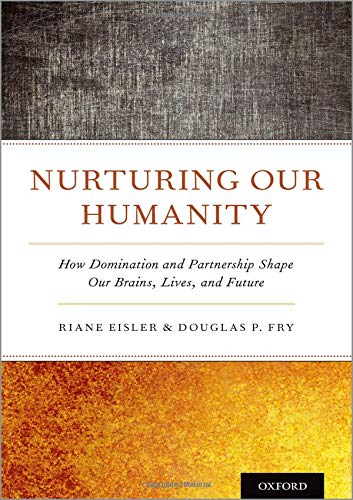Partnership Not Domination Fosters Wellbeing
Children and communities thrive with partnership systems.
The dark tales that humans tell about their past are untrue. According to anthropological and archeological evidence, 99% of the human genus’ past was spent in small-band hunter-gatherer bands who represent a partnership system that fosters cooperative, generous and largely peaceful persons (Ingold, 2005). A recent book by Riane Eisler and Douglas Fry (Nurturing our Humanity: How Domination and Partnership Shape our Brains, Lives and Future) traces the differences between partnership societies and dominator societies.
In a recent open access paper, Mary Tarsha and I integrate Eisler and Fry’s ideas with our own. We suggest that the first partnership system, evolved through the tree of life, and is represented by what we call the evolved nest,* a developmental system that brings about child and adult thriving.
Here are some excerpts from the paper, relevant to today’s world:
“Until recently in human species existence, most societies of the world flourished within egalitarian, interdependent partnership systems, practicing a gift economy with their ecological surroundings, fostering abundance (Gowdy, 1998, 2005; Narvaez, 2017; Narvaez, Four Arrows et al., 2019; Vaughan, 2015; Worster, 1994). Partnership societies like these value caring, empathy and equitable relations; respect diversity, individual rights, and nonviolence; and work cooperatively with one another (Eisler and Fry, 2019). More recently in human history, a different narrative about human possibility emerged, one that paints humanity as evolved to be selfish, destructive and violent, valuing hierarchy and conquest (Sahlins, 2008). Riane Eisler and Douglas Fry (2019) call these narratives ‘dark tales of humanity.’ Such tales contend that humans naturally dominate others and therefore need to create social structures oriented to controlling those destructive tendencies. Dominator societies have been imposing their ways onto the rest of the world for some time, increasing illbeing around the world through aggressive colonization (Narvaez, Four Arrows et al., 2019).”
“When societies operate by means of domination principles, they act from fear and greed, as many modern societies do, an unsustainable approach to living (Fry & Souillac, 2017; Eisler & Fry, 2019). When children are deprived of what they have evolved to expect, analogous to a starvation diet, susceptibility to ill health results and sociomoral capacities are hindered. A social starvation environment is marked by scarcity, leaving children to feel empty, afraid and untrusting of others. The child’s stress response can become highly activated, sometimes to the point of chronic stimulation, resulting in long-term pathologies that affect both cognitive and emotional functioning. Children become oriented towards withdrawn and/or aggressive behavior in social relationships, including the other-than-human world (Narvaez, 2014, 2016a, 2018a). Individuals become prone to supporting and participating in domination systems as a means to feel safe.”
“Eisler and Fry (2019) suggest that societies can transform themselves into partnerships. One place to start is the nest. When the nest is provided in infancy and childhood, neurobiological systems are nourished and supported with the right nutrients: love and supportive, responsive care as denoted by nest components. Similar to a healthy nutrition plan, when we feast on the right ingredients, we become and feel healthy. When children feast on love and responsive care—the type of care they have evolved to expect—they develop into happy, healthy and well-tuned members of society.”
The human evolved nest properly grows the human brain and body so that we can become cooperative, flourishing beings on every level.
To read the whole paper, go here.
*The evolved nest refers to early life soothing perinatal experiences, on request breastfeeding for several years, frequent moving affectionate (no negative) touch, positive climate, self-directed social play, responsive relationships including allomothers (other responsive adults), nature connection, and healing practices .
References
Eisler, R., & Fry, D. P. (2019). Nurturing our humanity: How domination and partnership shape our brains, lives, and future. New York, NY: Oxford University Press, USA.
Fry, D. P. (2006). The human potential for peace: An anthropological challenge to assumptions about war and violence. New York: Oxford University Press.
Fry, D. P., & Souillac, G. (2017). The original partnership societies: Evolved propensities for equality, prosociality, and peace. Interdisciplinary Journal of Partnership Studies, 4(1). Available at: pubs.lib.umn.edu/ijps/vol4/iss1/4
Gowdy, J. (1998). Limited wants, unlimited means: A reader on hunter-gatherer economics and the environment. Washington, D.C.: Island Press.
Gowdy, J. (2005). Gatherer-hunters and the mythology of the market. In R. B. Lee & R. Daly (Eds.), The Cambridge encyclopedia of hunter Is and gatherers (pp. 391–398). New York: Cambridge University Press.
Ingold, T. (2005). On the social relations of the hunter-gatherer band. In R.B. Lee, R.B. & R. Daly (Eds.), The Cambridge encyclopedia of hunters and gatherers (pp. 399-410). New York: Cambridge University Press.
Narvaez, D. (2014). Neurobiology and the development of human morality: Evolution, culture and wisdom (Norton Series on Interpersonal Neurobiology). New York, NY: W.W. Norton.
Narvaez, D. (2016). Embodied morality: Protectionism, engagement and imagination. New York, NY: Palgrave-Macmillan.
Narvaez, D. (2017). Getting back on track to being human. Interdisciplinary Journal of Partnership Studies, 4(1). Retrieved from https://pubs.lib.umn.edu/index.php/ijps/article /view/151
Narvaez, D. (Ed.) (2018). Basic needs, wellbeing and morality: Fulfilling human potential. New York: Palgrave-MacMillan.
Narvaez, D., Four Arrows, Halton, E., Collier, B., Enderle, G. (Eds.) (2019). Indigenous Sustainable Wisdom: First Nation Know-how for Global Flourishing. New York: Peter Lang.
Sahlins, M. (2008). The Western illusion of human nature. Chicago, IL: Prickly Paradigm Press.
Tarsha, M., & Narvaez, D. (2019). The Evolved Nest: A partnership system that fosters child wellbeing. International Journal of Partnership Studies, 6(3). Open access: doi.org/10.24926/ijps.v6i3.2244
Vaughan, E. (2015). The gift in the heart of language: The maternal source of meaning. Mimesis International.
Worster, D. (1994). Nature’s economy: A history of ecological ideas (2nd ed.). Cambridge, England: Cambridge University Press.


